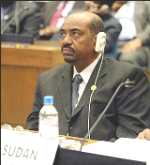Pressure grows on Sudan over Darfur crisis
LONDON, July 24 (AFP) — International pressure was growing Saturday on Sudan to get to grips with the humanitarian crisis in Darfur but Sudanese President Omar al-Beshir accused the outside world of using the situation to target Islam.
 Britain said it could send thousands of troops to the region if required, and Australia also said it was considering a UN request for military personnel to join a mission there.
Britain said it could send thousands of troops to the region if required, and Australia also said it was considering a UN request for military personnel to join a mission there.
The UN estimates up to 50,000 people have died in Darfur and about 1.2 million have been driven from their homes since a revolt against the Arab-dominated government in Khartoum broke out among indigenous black African ethnic minorities in February 2003.
The head of the British army General Sir Michael Jackson said in an interview with BBC News 24 on Friday that troops could go “if need be”.
“I suspect we could put a brigade together very quickly indeed,” he said.
Asked how many troops that would entail, he replied: “Five thousand.”
On Thursday British Prime Minister Tony Blair denied as “premature” a report that he had drawn up plans to send British troops.
Meanwhile Australian Defence Minister Robert Hill said the UN had approached Australia for a contribution to a UN force, which was expected to be in place by the end of the year.
“We are contemplating whether to make a contribution,” he said today. “It would be relatively modest and we haven’t made a final decision.
Khartoum has brushed off criticism that it is not doing enough to help alleviate the humanitarian situation in Darfur, described by the United Nations as the world’s worst, and has pledged to improve the access of international aid agencies to the region and the needy.
Sudanese President Omar al-Beshir has accused the international community of targeting Islam in Sudan, the pro-government Al-Anbaa reported Saturday.
The paper quoted Beshir as telling supporters in the central region of Gezira following Friday prayers that the real aim of the campaign against his country was not the situation in Darfur but to derail the growth of Islam in the country.
“The international concern about the Darfur issue is targeting the status of Islam in Sudan,” claimed Beshir, who seized power in a bloodless Islamist coup in 1989.
The European Union on Saturday warned Sudan’s foreign minister that the country will likely face international sanctions if there is not quick progress in Darfur.
“If the situation doesn’t improve quickly, sanctions by the international community will inevitably follow,” the news agency ANP quoted Dutch Foreign Minister Bernard Bot as saying following a meeting with visiting Foreign Minister Mustafa Osman Ismail.
“There has been improvement, but it is not sufficient,” said Bot, whose country currently holds the EU presidency.
On Thursday the United States put forward a draft UN Security Council resolution authorizing sanctions against Sudan if it does not prosecute Arab militia leaders behind atrocities in Darfur, particularly the notorious Janjaweed, who are blamed for most of them.
The same day the US Congress unanimously passed a non-binding resolution describing the atrocities committed in Darfur as “genocide” and calling on the White House to lead international efforts to intervene in the region.
However any UN resolution would “escalate and complicate rather than solve the Darfur crisis,” according to Al-Tigani Mustafa, chairman of the Sudanese parliament’s foreign relations committee, quoted by the daily Al-Rai Al-Aam on Saturday.
And the Chairman of parliament’s peace committee, Abdul Rahman al-Fandy, argued that the growing pressure and threats of sanctions were “not out of sympathy for the people of Darfur, but an attempt by some leaders to find a way out of their own problems.”
He also accused UN Secretary General Kofi Annan of “intensifying unnecessary and unjustified pressures” on Sudan, and the international community of ignoring reports about ceasefire violations by Darfur rebels.
